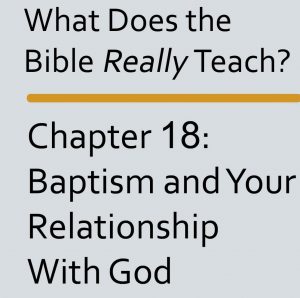Paragraph 1 (pp. 174-175) begins “Bible Teach” Chapter 18—“Baptism and Your Relationship with God”—by commenting about how eager the Ethiopian official in Acts 8 was to be baptized. You are supposed to feel the same way.
I recommend that you point out to the Witnesses how quickly Philip fulfilled his request. There were no lengthy educational sessions and no evaluations by elders to determine his worthiness to be baptized.
As this chapter unfolds, you’ll see all the requirements the Watchtower puts on people before they can be baptized. After you’ve covered them all in your study of the chapter, I’ll be recommending that you remind the Witnesses that none of the people in the Bible had to go through such a process in order to “qualify for baptism.”
Paragraph 2 (p. 175) lists “the Bible’s promise of everlasting life in Paradise, the true condition of the dead and the resurrection hope” as things you have learned by now “if you have carefully studied the earlier chapters of this book with one of Jehovah’s Witnesses.”
It goes on to say that you “have probably been associating with Jehovah’s Witnesses at their congregation meetings and have seen for yourself how they practice the true religion. Most important, you have likely begun to develop a personal relationship with Jehovah God.”
What does baptism signify?
Paragraph 3 (p. 175) tells you that you can “show that you want to serve God” by getting baptized in water and asserts that sprinkling or pouring aren’t proper methods of baptism because “Christian baptism… means being fully dipped, or immersed, in water.”
I recommend ignoring the claim that immersion is the only proper type of baptism and instead focusing on the meaning of baptism.
Paragraph 4 (p. 175) states, “Water baptism is a requirement for all who want to have a relationship with Jehovah God. Baptism publicly indicates your desire to serve God. It shows that you are delighted to do Jehovah’s will.”
In other words, Watchtower baptism is all about what you are going to do for God.
But biblically, baptism is a picture of what God has done for you at the moment of your conversion—death to the old life and rising via a new birth. This transformation by God is the foundation from which you are able to live the Christian life.
The difference provides you an opening to use the section of The New Birth Approach from my book, Getting Through to Jehovah’s Witnesses: Approaching Bible Discussions in Unexpected Ways, entitled, “The New Birth Provides an Inner Transformation” (pp. 131-133).
Ask the Witnesses to read Galatians 2:20 aloud from their translation: “I am nailed to the stake along with Christ. It is no longer I who live, but it is Christ who is living in union with me.” Jehovah’s Witnesses believe this is an experience only for the 144,000. Nevertheless, ask them when this death and newness of life occurred for Paul. Note that he speaks of it in the past tense, as something that has already happened to him.
Take them also to Romans 6:3-6 in their translation: “Or do you not know that all of us who were baptized into Christ Jesus were baptized into his death? So we were buried with him through our baptism into his death, in order that just as Christ was raised up from the dead through the glory of the Father, so we also should walk in a newness of life. If we have become united with him in the likeness of his death, we will certainly also be united with him in the likeness of his resurrection. For we know that our old personality was nailed to the stake along with him in order for our sinful body to be made powerless, so that we should no longer go on being slaves to sin.”
Explain to them that you believe it’s this experience that water baptism is supposed to symbolize. It’s a testimony that God has already worked an inner transformation in you by which he recognizes you as having spiritually died with Christ, been buried with Christ, and been raised a new creation to walk in newness of life.
Don’t expect them to agree with that, but make sure that they have heard that understanding of baptism and the scriptural basis for it.
Paragraph 4 (p. 175) says, “Water baptism is a requirement for all who want to have a relationship with Jehovah God.” I personally disagree with that conclusion. What about Jesus’ promise of paradise to the repentant thief who died next to him? He was never baptized. Likewise, what about Cornelius in Acts 10 who received the gift of the Holy Spirit and only later was baptized.
I’m not saying that Christians shouldn’t be baptized in water; I’m saying that it isn’t necessary for salvation.
Next week, we’ll look at some of the specific requirements the Watchtower imposes before a person can be baptized as a Jehovah’s Witness.


Leave a Reply
2 Comments on "What Does Baptism Signify?"
Well done! I look forward to the instalments of reasoning with JWs. I was baptized at my new church in May (2022) along with my younger brother. We were born in JWs, woke up in our 60’s. Now Christ is our Lord and Saviour, not a man made religion. Gods blessing be with you.
Thank you! That’s great news. Feel free to share more details if you would like to.